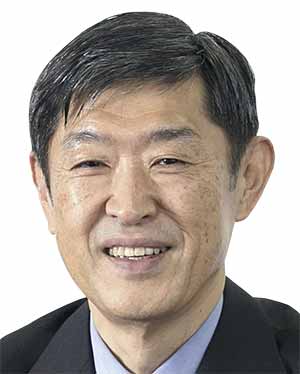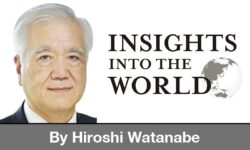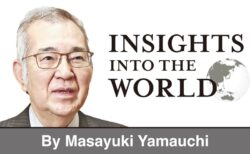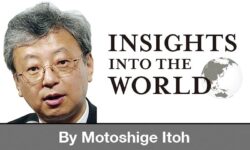12:50 JST, June 23, 2023
Newspapers often use “emerging and developing countries” as an alternative term for the Global South. There is no definite distinction between the two, but, in my opinion, the former — emerging and developing countries — is easier to understand.
When I think of emerging countries, the ones that belong to the Group of 20 forum for international economic cooperation come to mind first. In addition to the Group of Seven and other developed countries, as well as military and economic superpower China and military superpower Russia, the G20 also includes the eight countries of Argentina, Brazil, India, Indonesia, Mexico, Saudi Arabia, South Africa and Turkey. Almost all of them are emerging economies, while also being major nations in their respective regions.
Since the outset of the 21st century, the combined weight of the G7 in the world economy has been on the decline. It’s no wonder, therefore, that these emerging countries are increasingly asserting themselves.
India and certain other countries are not on board with anti-Russia sanctions, due largely to their years of reliance on Russian weapon supplies as well as the economic factor that Russian oil can be imported at lower prices.
However, these are not the only reasons: Many emerging countries also distrust what they see as developed countries’ double standards.
Middle Eastern countries regard as illegal not only Russia’s invasion of Ukraine but also the United States’ invasion of Iraq in 2003 that was launched without an appropriate U.N. Security Council resolution. Turkey remains disgruntled with the fact that it received no respect during the European Union’s expansion after the Cold War, despite Turkey being treated as a stalwart ally of the North Atlantic Treaty Organization during the Cold War.
In Africa, many developing countries were once colonized by the United Kingdom and France. It was the then Soviet Union that supported their movements for independence from colonial rule. France’s recent withdrawal of its troops from western Africa has given certain countries there no choice but to rely on the Wagner Group, a Russian private paramilitary unit, for national security.
The International Criminal Court issued a warrant for the arrest of Russian President Vladimir Putin in March. Yet, the warrant stands little chance of being executed. The ICC has so far issued many arrest warrants for influential figures from Africa, making emerging and developing countries feel that the “rule of law” promoted by the West is ultimately bullying the weak. If their distrust of the West grows and China and Russia take the initiative in a move within the BRICS forum — also involving Brazil, India and South Africa — to widen its membership, an expanded BRICS could end up providing a setting for a confrontation of emerging and developing countries versus developed ones.
But many emerging countries oppose the Russian invasion of Ukraine and, with the exception of Saudi Arabia, are on the path to democracy. Some people are critical of emerging countries for not holding fair elections, but there is evidence that democracy there is working to a certain extent. For example, in the recent presidential elections in Turkey, the incumbent president had to fight a close battle with rival candidates.
To put it another way, emerging countries are seeking to ensure their independence and self-governance — they do not disapprove of such universal principles as the rule of law, liberalism and democracy. Nonetheless, they are pursuing more moderate principles, not the aggressive ones sought by the West.
Japan’s important role
Japan is positioned to play an important role amid these circumstances.
Japan was once bashed for allegedly making inroads into foreign markets with no guiding philosophy. Likewise, it came under criticism for its economic support to autocratic countries in Southeast Asia. Nevertheless, Japan’s long-term, patient cooperation eventually helped countries such as Indonesia and the Philippines democratize themselves and emerge as stable countries. When comparing such outcomes with the current state of African countries that have been assisted by the West, I am confident that Japan’s contributions deserve to be commended as remarkable achievements.
It is therefore wrong to say that Japan’s diplomacy is not based on any philosophy.
In 2006, then Foreign Minister Taro Aso advocated creating the “Arc of Freedom and Prosperity” as a new pillar of Japan’s diplomacy, based on his conviction that economic development was not sustainable if it did not reflect the voices of the people. In 2016, then Prime Minister Shinzo Abe set out his “Free and Open Indo-Pacific” vision, calling for ensuring freedom of navigation, free trade and peaceful resolution of conflicts. Both leaders championed the importance of upholding democracy, liberalism and the rule of law in a moderate manner — their concepts went beyond simple military and economic strategic concepts.
Since the late 1990s, Japan has committed to the concept of human security, ensuring the protection of everyone’s right to live in dignity. As a result, Japan has chosen to offer hands-on capacity building support, based on the philosophy of human security, to rescue people affected by dire situations abroad, instead of immediately resorting to military intervention.
As for the rule of law, Japan undertook time-consuming projects to indirectly help the compilation of laws by current and former socialist countries like Cambodia, Laos and Vietnam where no market economy-compatible laws had existed. Such projects were possible thanks to Japan’s own experience of painstakingly writing modern legal codes in the Meiji era (1868-1912).
For countries like the Philippines that are made up of many islands and therefore prone to smuggling activities and pirate attacks, Japan provided indirect assistance in establishing government agencies such as the coast guard, so they could conduct maritime policing on their own.
Japan has refrained from hastily requiring countries where genocides took place, like Cambodia and Rwanda, to democratize and hold the people involved accountable for those tragedies. Neither does Japan think it should require Vietnam, faced with a prodigious threat from China, to democratize itself with great speed. These are examples of Japan’s long-term indirect cooperation approach.
Emerging countries are struggling with tremendous domestic challenges. For instance, India’s annual per capital income is still low at about $2,200, with the income gap between the rich and poor regions remaining terrible. Japan has been conducting various forms of cooperation with India, including the construction of a high-speed train route using Japan’s Shinkansen technology. It has also been involved in projects in various parts of the South Asian country for subway lines, agriculture development, forestry preservation and sanitation improvement, among many others. India’s further development is expected to curb China’s further rise.
In the meantime, many of the emerging countries are major powers in their respective regions and the reality is that they are not necessarily liked by their neighboring countries. When that is the case, Japan should give them advice as a friend.
New cooperation guideline
I have so far touched mostly on Japan’s relations with emerging countries. There are developing countries that are poorer and smaller. They have suffered greatly from the war in Ukraine in terms of imports of energy, food and other goods. It goes without saying that we have to provide them with more robust support.
Japan’s official development assistance has played a large role in implementing its diplomacy. Even though Japan’s ODA to emerging and developing countries has not been sufficient in quantitative terms, it has extended hands-on support carefully tailored to the specific needs of recipient countries or partner countries. This is why Japan’s ODA plans have been globally praised.
It is very good that the government early this month revised Japan’s Development Cooperation Charter, pledging that it would “expand its ODA in various ways.” However, it is worrisome that the updated ODA guideline emphasizes two particular concepts — mentioning development cooperation as “one of the most important tools of Japan’s diplomacy” and proclaiming that the government will strengthen “offer-type” cooperation while “proactively proposing attractive menus that leverage Japan’s strengths.”
Above all else, rich countries have an obligation to help extremely poor ones. From the standpoint of Japan’s diplomacy, it is natural for ODA plans to be either expanded, reduced or modified to some extent. But, as for the new guideline’s acknowledgment of development cooperation as a “tool of diplomacy,” the government should keep itself from emphasizing that particular point too much to have the credibility of Japan — which has been achieved through decades of effort to stand by partner countries — undermined.
And, Japan has thus far extended cooperation in response to specific requests from partner countries. In practice, it has sounded out partner countries on what forms of cooperation would be most desirable for them and held bilateral talks to find optimal solutions. I hope that this tradition should be upheld in future offer-type cooperation.

Shinichi Kitaoka
Kitaoka is a professor emeritus at the University of Tokyo, specializing in Japanese political and diplomatic history. His previous posts have included Japanese ambassador to the United Nations in 2004-06 and president of the Japan International Cooperation Agency in 2015-22.
The original article in Japanese appeared in the June 18 issue of The Yomiuri Shimbun.
Top Articles in Editorial & Columns
-

Riku-Ryu Pair Wins Gold Medal: Their Strong Bond Leads to Major Comeback Victory
-

40 Million Foreign Visitors to Japan: Urgent Measures Should Be Implemented to Tackle Overtourism
-

China Provoked Takaichi into Risky Move of Dissolving House of Representatives, But It’s a Gamble She Just Might Win
-

University of Tokyo Professor Arrested: Serious Lack of Ethical Sense, Failure of Institutional Governance
-

Policy Measures on Foreign Nationals: How Should Stricter Regulations and Coexistence Be Balanced?
JN ACCESS RANKING
-

Japan PM Takaichi’s Cabinet Resigns en Masse
-

Japan Institute to Use Domestic Commercial Optical Lattice Clock to Set Japan Standard Time
-

Israeli Ambassador to Japan Speaks about Japan’s Role in the Reconstruction of Gaza
-

Man Infected with Measles Reportedly Dined at Restaurant in Tokyo Station
-

Videos Plagiarized, Reposted with False Subtitles Claiming ‘Ryukyu Belongs to China’; Anti-China False Information Also Posted in Japan























